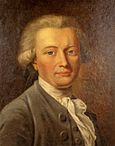Portal:Journalism/Selected biography/13
Georg Forster (November 27, 1754 – January 10, 1794) was an 18th-century German naturalist, ethnologist, travel writer, journalist, and revolutionary. At an early age, he accompanied his father on several scientific expeditions, including James Cook's second voyage to the Pacific. His report from that journey, A Voyage Round the World, contributed significantly to the ethnology of the people of Polynesia and remains a respected work among both scientists and ordinary readers. As a result of the report Forster was admitted to the Royal Society at the age of 22 and he came to be considered one of the founders of modern scientific travel literature. Forster was a central figure of the Enlightenment in Germany, and corresponded with most of its adherents, including Georg Christoph Lichtenberg who was a close friend of his. His ideas and personality influenced strongly one of the greatest German scientists of 19th century, Alexander von Humboldt. In July 1793, while he was in Paris as a delegate of the young Mainz Republic, Prussian and Austrian coalition forces regained control of the city and Forster was declared an outlaw. Unable to return to Germany and separated from his friends and family, he died in Paris of illness in early 1794.

